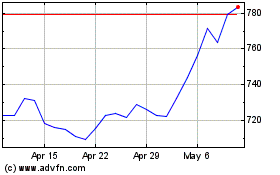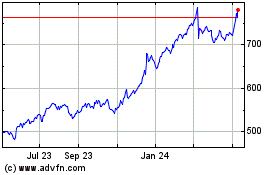By Brian Costa
The most coveted new ball in golf arrived at Marty Rosenblatt's
home just before Christmas, after he paid double the retail price
for a half dozen on eBay. "Just to be the first kid on the block to
have them," he said.
The block, in this case, was Mirasol, a country club in Palm
Beach Gardens, Fla. that costs $130,000 to join. The ball is a
Costco product that retails for $1.25.
"One of my friends said, 'How did you get them? I thought they
were sold out,'" said Mr. Rosenblatt, a 68-year-old retired partner
at Deloitte. "I said, 'Yeah, I have connections.'"
Costco, the warehouse retail giant, first began selling golf
balls last fall, under its Kirkland Signature brand that is affixed
to a wide range of products and carries discount prices. Available
for $29.99 for two dozen, the balls instantly ranked among the
cheapest on the market.
But what made the balls a hot item among fanatical golfers is
the revelation that, by some accounts, they perform like rivals
that sell for more than twice as much.
That idea sent shock waves through a billion-dollar industry,
left Costco out of stock for weeks at a time and caused
secondary-market prices for the ball to soar. Its popularity is
threatening one of the sport's long-held consumer beliefs: when it
comes to the quality of golf balls, you generally get what you pay
for.
"This is just a perception killer," said Adam Beach, owner of an
equipment review website called MyGolfSpy, which bills itself as
the Consumer Reports of golf. "This will change the entire
industry."
Making the phenomenon all the more surprising is that Costco
isn't really in the golf business. It doesn't employ teams of ball
engineers, researchers and designers like name-brand ball makers
such as Titleist, Callaway and Bridgestone. It doesn't endorse any
professional golfers.
The balls were made at a factory in South Korea by a company
called Nassau Golf, which also manufactures balls for TaylorMade,
one of the major equipment manufacturers. According to Nassau
officials, the company had an excess supply that it sold to Costco
through a third-party trader. But that supply appears to have been
exhausted by overwhelming demand.
The balls have been out of stock for much of the past two
months, save for a few fleeting spurts of availability. Within the
past week, Costco removed the listing for them from its website. It
is unclear when or even if they will be in stock again.
"We don't have a certain amount that we promise to deliver to
Costco," said Shim Kwang-Suk, executive director at Nassau's ball
plant in Korea. "We produce other products first and deliver to
Costco if we have products left."
Costco officials didn't respond to requests for comment.
The balls, which came on the market with little fanfare, have
become a source of intrigue among avid golfers.
A conversation thread about them on GolfWRX, an online community
for equipment aficionados, has generated more than 5,500 replies.
The ball was such a curiosity to one major equipment company that
employees there cut one in half to study its interior, hoping to
discern more about its origin and composition.
The makeup of the ball, which conforms to U.S. Golf Association
regulations, isn't unusual. It has four layers and, like most
popular golf balls, has a cover made of urethane rubber.
Nor is Costco's strategy without parallel. In the early 2000s,
the grocery chain Trader Joe's created a low end of the market for
another seemingly genteel product: wine. It did so by buying from a
major California winery and selling bottles for $1.99. By 2012,
Trader Joe's said it had sold 600 million bottles of so-called "Two
Buck Chuck" -- named for the Charles Shaw label it carried -- and
two of the wines won prestigious awards at international
competitions.
Likewise, what's striking about the Costco golf ball is its
perceived quality relative to its price.
In November, MyGolfSpy published the results of an independent
test that compared the ball's performance characteristics --
distance and rate of spin, for instance -- favorably to those of
the Titleist Pro V1, the perennial best-selling ball in golf. The
Pro V1 is priced at around $4.00 per ball.
A Titleist spokesman declined to comment.
Other early users reported similarly good results, helping to
spark a run on Kirkland balls. The upshot: balls whose primary
allure was supposedly their low price are now fetching premium
prices because of their scarcity.
Clinton Svoboda, a 43-year-old electrician in Iowa City, Iowa,
said he bought 44 dozen balls through multiple orders on Costco's
website and has since sold 40 dozen of them on eBay. He sells them
for up to $40 per dozen, including the cost of shipping, which
leaves him with around a $10 profit per box.
"I wasn't going to buy so many," he said, "but considering I'm
making $10 per dozen, it's basically free money."
The same low prices that sparked a frenzy for the Kirkland ball
may also have endangered its future. According to a Nassau
executive based in Europe, the company believes the expected retail
price for the ball would be closer to $45 per dozen, all costs
considered.
This executive said that both Nassau and TaylorMade, its biggest
client, are unhappy with the rise of the $1.25 golf ball and that
the company won't sell excess supply in such large quantities
again. A TaylorMade spokesman didn't respond to a request for
comment.
Meanwhile, golfers wonder if or when they will see the Kirkland
ball on store shelves again.
William Stalsworth, a 61-year-old retiree living in Naples,
Fla., said an employee at a nearby Costco store recently told him
the balls would be back in stock this spring. To hold him over
until then, he paid a private seller $300 for eight dozen.
"When Costco gets them back, I'm going to buy enough to last me
another 10 years," he said. "And I won't be putting them on
eBay."
Min Sun Lee contributed to this article
Write to Brian Costa at brian.costa@wsj.com
(END) Dow Jones Newswires
January 19, 2017 08:47 ET (13:47 GMT)
Copyright (c) 2017 Dow Jones & Company, Inc.
Costco Wholesale (NASDAQ:COST)
Historical Stock Chart
From Mar 2024 to Apr 2024

Costco Wholesale (NASDAQ:COST)
Historical Stock Chart
From Apr 2023 to Apr 2024
